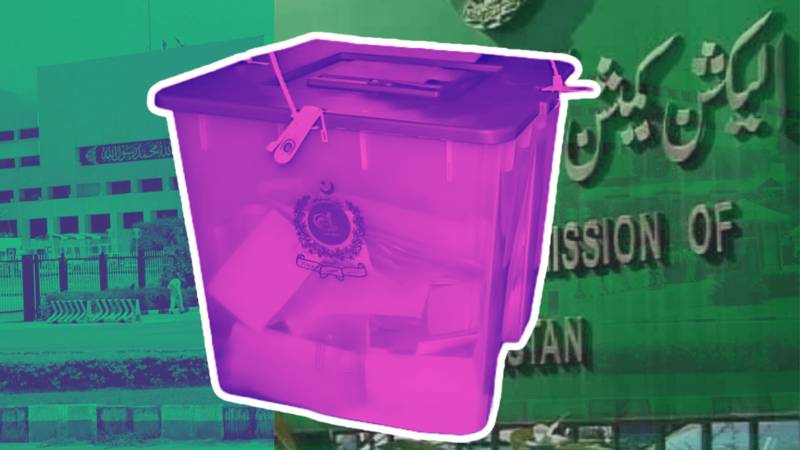
The Election Commission of Pakistan (ECP) on Thursday finally settled on a date to hold general elections in the country, but the abrupt announcement of the date suggests that the commission wilted in the face of insurmountable pressure from various political parties and other stakeholders who were demanding an early date for elections. The date, however, has allowed stakeholders of the country's democratic process to heave a sigh of relief to see the uncertainty end. However, politicians say the real tests for the apex poll body are just starting.
The Election Commission of Pakistan (ECP) on Thursday was forced to disclose a definitive date for elections in the Supreme Court, where Chief Justice of Pakistan Qazi Faez Isa was heading a bench hearing the elections case.
Among other major developments in the case on Thursday, the representative of the ECP was asked about a date for elections. At this, the ECP disclosed that they had decided on February 11, 2024, as the election date.
But when CJP Isa asked if the date had been finalised in consultation with President Dr Arif Alvi, the commission did not have a satisfactory answer. CJP Isa directed the ECP to consult with President Alvi on the date and finalise the date. By evening, Chief Election Commissioner Sikandar Sultan Raja and four members of the ECP, along with the Attorney General of Pakistan Mansoor Usama Awan, consulted with President Alvi and unanimously agreed that elections would be held on February 8, 2024. The ECP formalised this through a notification issued shortly after.
Ever since the ECP announced its process for conducting fresh delimitations in line with Constitutional and legal requirements after the government ratified a new census, major political parties have been demanding that the apex poll body announce a schedule for the elections as well so that any uncertainty surrounding the elections can be put to bed and political parties can launch their electoral campaigns.
In background discussions, senior members of political parties and high-ranking officials at the ECP admitted that serious questions had been raised over the electoral watchdog and whether it could guarantee elections in the country per the indicated date at the end of January 2024.
In the end, the Supreme Court (SC) reportedly joined hands with political parties to compel the commission to share a date for elections.
Leaders of major political parties, including Pakistan Peoples Party (PPP) Chairman Bilawal Bhutto Zardari, Jamiat Ulema-e-Islam Fazl (JUI-F) chief Maulana Fazlur Rahman, and Jamaat-e-Islami (JI) chief Siraj Ul Haq have been for weeks demanding that the commission disclose the date for elections. Last week, President Arif Alvi appeared to doubt the ECP and its intentions to hold polls on time. As a result, the ECP rushed to dispel the impression of any delays in polls.
Sharing his views, Pakistan Peoples Party Parliamentarians (PPPP) Secretary General Senator Farhatullah Babar said that the ECP must now ensure, and be seen to ensure, that there are no hiccups in the elections, including no gerrymandering or political engineering in the run-up to and during elections.
"It will be a disaster if elections and subsequent transfer of power are seen to be manipulated as has happened in the past," he said while speaking to [The Friday Times].
These elections, he said, have the potential to "make or break the system and the democratic project [in Pakistan]".
"How the elections are conducted and how they are perceived by the people to have been conducted will be the first line in the history of the incumbent ECP," he said, adding that the conduct of the polls will determine the direction taken by the state and society in the third decade of the 21st century.
"We will keep watching and keep our fingers crossed. Candour and past experience unfortunately permit no other judgement."
Babar added that their demand was only for the ECP to adhere to the constitutional requirements for elections.
"If that obligation wasn't met, the second best thing was to adhere to the end January date it had previously publicly announced," he said, lamenting, "It failed to adhere to both."
"A few days here and there may not seem much to some, but from the standpoint of adhering to the Constitution and honouring public announcements made previously by the election body, it dents credibility and thus makes a difference. Even a delay of a few days tends to trivialise a constitutional responsibility and solemn public statement."
Despite that, Babar hoped that not only would elections be held on the promised date but that they would be held with a level playing field provided to all political parties and their leaders.

